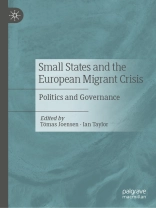This edited book examines the experience of small states in Europe during the 2015–2016 migration crisis. The contributions highlight the challenges small states and the European Union faced in addressing the massive irregular flow of migrants and refugees into Europe and the Schengen Area. Small states adopted a number of coping strategies and proved relatively effective in navigating the storm they faced. Externally they pursued strategies of shelter-seeking, hiding, hedging and norm entrepreneurship, while domestically they tended to securitize migration and to pursue scapegoating by blaming the EU and other states for the nature and magnitude of the crisis. During this crisis management, their small administrations proved resilient and flexible in their responses, despite suffering from limited resources and being subject to the shifting preferences of stronger actors. This book shows that independent of whether we view the migration crisis as a crisis for the European Union or Europe as a whole, or how we interpret the intensity and severity of the crisis, this was a crisis for small states in Europe. The crisis disrupted the liberal and institutionalized order upon which small states in the region had increasingly based their policies and influence for more than 60 years.
Table des matières
PART 1: Introduction and Framework.- 1.Small States and the Migrant Crisis in Context.- 2.Analysing Small States in Crisis: Fundamental Assumptions and Analytical Starting Points.- PART 2: Small States and the Current Political Turmoil Related to Immigration.- 3.Immigration-Integration: A New Opportunity for the EU?.- 4.Openness Versus Helplessness: Europe’s Border Crisis, 2015-2018.- PART 3: On the Frontline: The Experiences of the Border States.- 5.The (De)Europeanisation of Greece: Experience from the Eye of the Storm.- 6.Migration and Security: The Case of Greece.- 7.Malta: A Janus Faced Migration and Integration Policy.- PART 4: Waving Them on? The Experiences of Peripheral States.- 8.Coping with the Migration Crisis in a Small States in the European Union: The Experience of Slovenia.- 9.The 2015 Migration Crisis as an Identity Crisis for Iceland .- 10.Small States: “The Gatekeepers” of EU Borders During the Migration Crisis.- 11.A Small Administration Facing a Complex Policy Challenge: Estonia and the 2015 Refugee Crisis.- PART 5: Conclusion.- 12.Small States and the European Migrant Crisis: New Challenges and Coping Strategies.
A propos de l’auteur
Tómas Joensen is Researcher and Program Manager at the Centre for Small State Studies, Institute of International Affairs, University of Iceland
Ian Taylor is Professor of International Relations and African Political Economy at the University of St. Andrews, Scotland, UK












